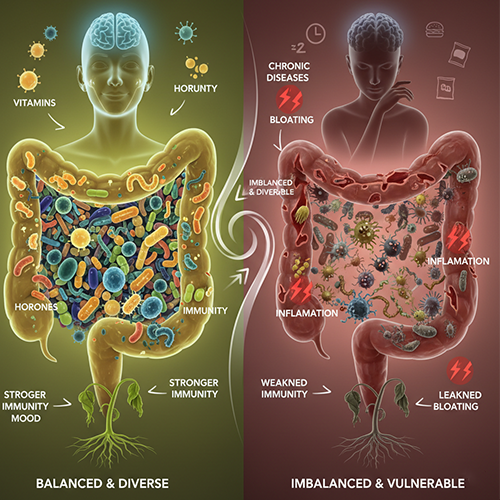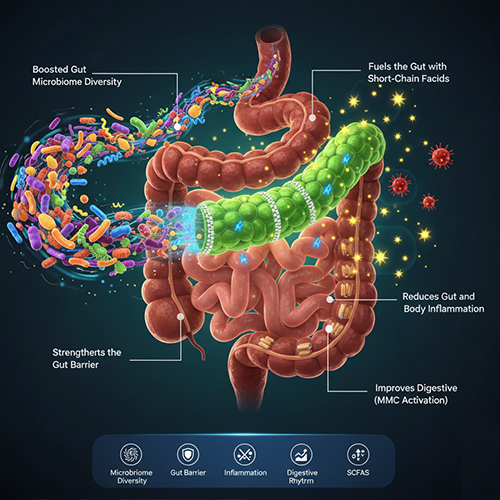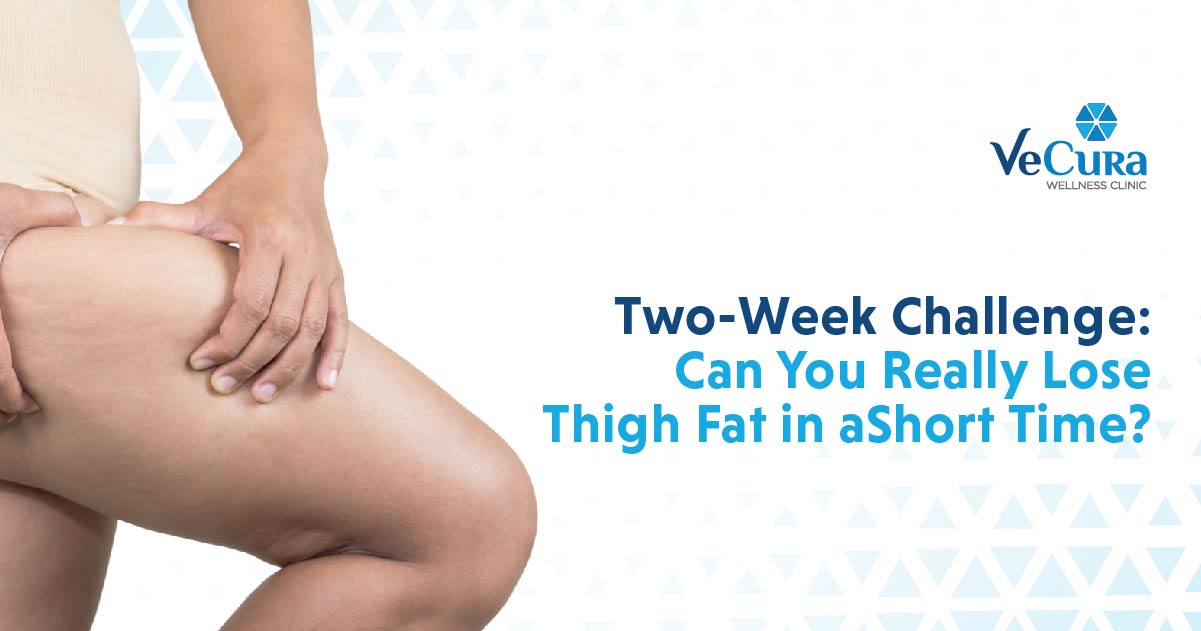When most people think about intermittent fasting (IF), the first thing that comes to mind is time-restricted eating that promotes weight loss. And while that’s a powerful benefit, researchers are discovering something even more fascinating: time-restricted eating — especially a 10–12 hour eating window with an early dinner can dramatically improve gut health.
Your gut is home to trillions of microbes that influence everything from digestion and immunity to inflammation and even mood. Scientists now refer to this ecosystem as the “second brain,” because its impact on overall health is that significant. By eating within a shorter window and avoiding late-night meals, you’re not just helping your waistline you’re nurturing a stronger, more resilient gut.
In this article, we’ll explore how a 10–12 hour eating window with early dinner works, the science behind its gut-healing benefits, and why it may be one of the most powerful lifestyle choices you can make for long-term wellness.
The Gut: More Than Just Digestion
The gut microbiome is a vast community of bacteria, viruses, fungi, and other microbes living in the digestive tract. Far from being harmful, many of these microbes are actually beneficial. They help break down complex foods, produce vitamins, regulate hormones, train the immune system, and create anti-inflammatory compounds.

When the microbiome is balanced and diverse, you enjoy better digestion, stronger immunity, and even improved mood. But when it’s out of balance — often due to poor diet, stress, lack of sleep, and constant snacking — the gut becomes vulnerable. This can lead to bloating, inflammation, leaky gut, weakened immunity, and a higher risk of chronic diseases.
That’s where a 10–12 hour eating window with early dinner comes in.
What Is a 10–12 Hour Eating Window with Early Dinner?
This approach is a form of time-restricted feeding (TRF). It means you eat all your meals within a 10–12 hour period — for example, between 8:00 AM and 6:00 PM — and fast until the next day’s window begins.
The key difference between this and other styles of fasting is the early dinner. Instead of eating late into the night, you stop eating earlier, which aligns your food intake with your body’s natural circadian rhythm. Studies show that our metabolism, digestion, and gut microbiome work best during the day and slow down significantly at night. By eating earlier, you’re working with your body’s clock, not against it.
How Does It Improve Gut Health?

1. Boosts Gut Microbiome Diversity
One of the most exciting findings about this pattern is its potential to increase microbial diversity. Diversity is essential because the more types of microbes you have, the more resilient your gut becomes.
Fasting periods encourage beneficial microbes like Akkermansia muciniphila and Faecalibacterium prausnitzii to thrive. These bacteria strengthen the gut lining, regulate immunity, and produce anti-inflammatory compounds. At the same time, fasting can reduce the dominance of harmful, sugar-loving bacteria that trigger inflammation and digestive distress.
Why this matters: A diverse microbiome is linked to better digestion, lower risk of obesity, and stronger long-term metabolic health.
2. Strengthens the Gut Barrier
Your gut lining acts as a barrier between the digestive tract and the bloodstream. When it’s healthy, it allows nutrients to pass through while blocking toxins, pathogens, and undigested particles.
Poor diet, chronic stress, and late-night eating can weaken this barrier, creating tiny gaps — often called “leaky gut.” This allows harmful substances to seep into the bloodstream, triggering widespread inflammation.
Intermittent fasting gives the gut lining time to rest and repair. It also encourages the growth of Akkermansia, a bacterium that supports mucin production — the protective mucus layer that shields the intestinal wall. The result is a stronger, more resilient gut lining that protects your entire system.
3. Reduces Gut and Body Inflammation
A disrupted gut microbiome often produces toxic by products such as lipopolysaccharides (LPS), which drive chronic inflammation throughout the body.
By improving microbial balance and lowering harmful metabolites, fasting helps reduce inflammatory markers like C-reactive protein (CRP). This benefits the digestive system and helps protect the heart, liver, brain, and metabolism.
People practicing early time-restricted feeding frequently experience drops in inflammation, supporting lower risk of issues like fatty liver disease, type 2 diabetes, and cardiovascular problems.
4. Improves Digestive Rhythm (MMC Activation)
Your gut isn’t designed to work around the clock. Between meals, it performs a natural cleansing process known as the migrating motor complex (MMC) — a sweeping wave that clears out undigested food and bacteria from the small intestine.
Constant snacking disrupts this cycle, leaving behind food particles that feed unwanted bacteria. This often leads to bloating, indigestion, or bacterial overgrowth (SIBO).
When you eat within a 10–12 hour window and allow longer fasting breaks, the MMC can function more effectively. This means better digestion, less bloating, and a healthier balance of bacteria in the small intestine.
5. Fuels the Gut with Short-Chain Fatty Acids (SCFAs)
Another way fasting supports gut health is by encouraging the production of short-chain fatty acids (SCFAs), particularly butyrate.
SCFAs are produced when beneficial gut bacteria ferment dietary fiber. They feed colon cells, reduce inflammation, boost immunity, and may lower the risk of colon cancer.
By rebalancing the microbiome, intermittent fasting can enhance SCFA production, which further strengthens the gut barrier and supports long-term digestive health.
Why Early Dinner Matters More Than You Think
The timing of your meals is just as important as the length of your eating window. Eating late at night disrupts the body’s circadian rhythm, which regulates hormone release, digestion, and microbiome activity.
At night, your digestive system slows down. Enzymes are less active, bile flow decreases, and gut bacteria switch to a “rest mode.” Eating heavy meals late forces the gut to work against its natural rhythm, leading to sluggish digestion, reflux, poor sleep, and microbial imbalance.
By finishing dinner early ideally before 7 or 8 PM you align your eating pattern with your body’s internal clock. This allows the gut to rest, repair, and regenerate overnight. It also helps prevent harmful bacterial overgrowth and reduces the risk of late-night sugar cravings and weight gain.
Beyond the Gut: Whole-Body Benefits
- Better energy and mental clarity thanks to reduced inflammation and a healthier microbiome–brain connection.
- Improved sleep quality since late-night digestion no longer interferes with rest.
- Balanced blood sugar levels, reducing the risk of prediabetes and type 2 diabetes.
- Healthier liver function, as the fasting period allows the liver to detoxify and repair.
- Enhanced weight management, not just from fewer calories, but from improved hormonal balance.
Practical Tips to Get Started
- Choose a 10–12 hour eating window that fits your lifestyle, e.g. 9:00 AM– 7:00 PM or 8:00 AM–6:00 PM.
- Prioritize whole foods high in fiber, lean proteins, healthy fats, and plenty of vegetables to nourish gut bacteria.
- Avoid late-night snacking, even if you finish eating earlier in the day. Let your gut rest overnight.
- Stay hydrated water, herbal teas, and black coffee (without sugar) are allowed during fasting hours.
- Be consistent. Regular eating times help strengthen your microbiome’s natural rhythm.
Final Thoughts
A 10–12 hour eating window with an early dinner isn’t just about trimming your waistline — it’s about creating the ideal environment for your gut to thrive. From boosting microbial diversity and strengthening the gut lining to lowering inflammation and supporting natural digestive rhythms, this approach can transform gut health in profound ways.
Because the gut influences so many aspects of health immunity, mood, metabolism, and even chronic disease risk — improving it through intermittent fasting offers benefits that go far beyond digestion.
In a world where late-night eating, constant snacking, and processed foods are the norm, adopting a simple shift like finishing dinner early and respecting a 10–12 hour eating window may be one of the most powerful gifts you can give your body. Your gut and your whole health will thank you.










